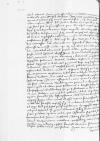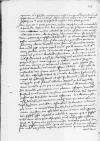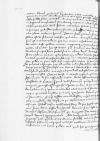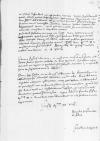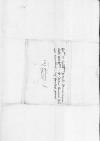⌊⌋ ad te superiore mense Iunio de iis, quae tunc occurrebant atque, ut opinor, satis copiose ad ⌊⌋ tuas, verum cum prospicerem de securo fidoque tabellario, cui ⌊⌋ committerem, perlatus est ad nos sub finem mensis illius nuntius ⌊caesarem⌋ decrevisse adversus ⌊Saxoniae ducem⌋ electorem et ⌊lantgravium Hassiae⌋ pro sua auctoritate agere atque in eos uti rebelles et malorum omnium auctores concitatoresque animadvertere, quas ad res obeundas cum armis opus esset, magnos equitum peditumque delectus ubique fieri. Quo nuntio cum nos, qui cf. Stat. Ach. 1.807-808 At tu tranquillus in alta pace mane ⌊in alta pace sederecf. Stat. Ach. 1.807-808 At tu tranquillus in alta pace mane ⌋ credebamus, non parum consternati animo essemus, prospicientibus, quam arduam provinciam ⌊maiestas caesarea⌋ aggrederetur at necessariam tamen, parendumque esset ipsius imperio, varia cuilibet nostrum munia iniuncta fuere. Quae facile effecere, ut ⌊⌋ meas ad te non statuerim tam periculoso tempore, nisi fidis manibus, credere.
Et mihi quidem incubuit cum iis ⌊Hispanorum⌋ atque ⌊Italorum⌋ cohortibus, quae ⌊regi Angliae⌋ durante bello servierant et sub id tempus pace inter ⌊Francos⌋ ⌊Anglos⌋que composita exauctoratae per provinciam nostram sese diffuderant, tractare eisdemque provinciam nostram quovis modo exonerare proposita illis spe, si ad ⌊caesarem⌋ contenderent, fore, ut militari stipendio ibi donarentur, nam nobis haudquaquam illorum servitio opus esse neque toleraturos, ut populo nostro diutius sint onerosi. Quibus quidem persuasionibus inducti, praesertim vero accedente liberalitate serenissimae ⌊reginae Mariae⌋, quae de suo proprio, non de ⌊caesaris⌋ aerario, aliquot milia florenorum donativi loco illis elargita est, facile innocui transivere partimque in nostro, partim in Eburonum vicinorum, partim etiam in Iuliacensium agro reliquas copias, quas caesaris nomine illustris dominus ⌊Maximilianus ab Egmonda⌋ comes Burensis parabat, praestolarentur.
At vero iam sub huius conclusionis initium ⌊caesar⌋ praefato illustri ⌊comiti Burensi⌋ mandaverat, ut ex nostra vicinaque ⌊Inferioris Germaniae⌋ gente duodecim milia peditum et tria equitum gravis armaturae colligeret. Quibus ut ex ordinario nostro equitatu alas aliquot adiungeremus ceteraque ad profectionem necessaria, imperaverat. Quo factum est, ut ita exigente celeritate nemini nostrum non fuerit satis negotii in promovenda
⌊illius⌋ abitione, cum nec ipse ullum omitteret momentum ad ea obeunda, quae commissa illi fuere. Itaque intra mensis unius spatium equitatus peditatusque omnis paratus fuit.
Interea venit in aulam nostram illustris dominus ⌊comes a Buren⌋, cum quo de te longus mihi sermo fuit et suavissimus, cum ille nihil magis optare se dixit, quam ut aliquando tecum adhuc congredi convivereque posset. Addidit et ad te ⌊⌋ sua manu suoque ⌊Marte⌋ compositas, utcumque sonantes Latine et praeseferentes non male ab adulescentia institut[um] profecturum fuisse in litteris, nisi diversum vitae genus illum a studiis revocasset. Eas ad te mitto cum praesentibus.
Nec multo post praemisso universo milite, qui ex equitibus ter mille conducticiis, nostratibus ordinariis supra mille quadringentis, comprehensis aulicis caesareis aliisque sponte ad eam militiam proficiscentibus, gravioris, inquam, armaturae, levioris autem ⌊Italis⌋ su[b] ⌊Hyppolito Palavicino⌋ ducentis, totidem ⌊Hispanis⌋ et aliquot ⌊Graecis⌋, ⌊Epyrotis⌋ et ⌊Dalmatis⌋, qui omnes ⌊regi Angliae⌋ servieran[t], et ducentis ⌊Germanis⌋ archabusariis, peditibus autem ⌊Germanis Inferioribus⌋ duodecim milibus, Hispanis Italisque, qui et ipsi ex servitio venerant ⌊Anglorum⌋, tribus fere milibus, machinis autem bellicis duodecim cum rebus omnibus necessariis constabat, ⌊ipse⌋ eos prope ⌊Coloniam⌋ assecutus non procul a ⌊Rheni⌋ rip[a] iter fecit, nulli nocuit tandemque non procul a ⌊Byngio⌋ flume[n] Rhenum, quod ab altera parte ⌊Fridericus a Reyffenberg⌋ et com[es] ⌊Christophorus ab Oldenborg⌋, is qui infeliciter in ⌊Dania⌋ militavit, cum duodecim aut amplius peditum milibus atque aliquot al[is] equitum servandum sibi desumpserant, illis invitis transmisit coegitque fugam inire omnes ad ipsa moenia ⌊Francophordiae⌋ nonnullis, uti fit, caesis captisque signis militaribus aliquot. Receptis ergo locis, quae hostes prius insederant, ex opposito ⌊Moguntiae⌋ reliquus exercitus est per otium traductus ibique ad eum convenere supra quattuor equitum milia, quae caesareum stipendium sub marchionibus ⌊Ioanne⌋ et ⌊Alberto⌋, itemque sub administratore ⌊ordinis Teuthonicorum⌋ merebant, praepeditique eatenus, ut ⌊Rhen[um]⌋ transire non auderent, ipsius ⌊Burensis⌋ adventum fuerant per aliquot hebdomadas praestolati. Quare tam magno auctus
equitatu et a ⌊caesare⌋ accelerare iussus magnis itineribus nullo hoste obviam illi ire audente decima quinta Septembris in castra ⌊caesareae maiestatis⌋ prope ⌊Ingolstadium⌋ magna cum gloria pervenit.
Dum haec ea in parte geruntur, accidit ⌊Machliniae⌋ res memorabilis et horrenda. Septima enim die mensis Augusti sub horam undecimam ante mediam noctem obortus est timor quidam inter cives nullo certo auctore, adeo ut plerique clamarent illum esse extremum diem peterentque confessiones suas audiri et ad monasteria templaque passim concurrerent, cum subito orta sunt gravissima tonitrua fulminaque, adeo ut tenebras noctis fulminis claritas vinceret, nec multo post crepuit ingens turris, quae ad murum urbis erat, quondam porta, a multo autem tempore obstructa, in qua ingens vis pulveris bombardici servabatur, et ita crepuit, ut ab imis fundamentis eversa sit lapidesque eius per totam ⌊urbem⌋ et proximos agros eiecti magnam in ceteris domibus stragem una cum tremore, qui terrae motus videbatur, quem ingens illa pulveris bombardici vis incensa effecit, edidere. Absumpsit ea miserabilis nox supra centum homines, laesit et mutilavit ad mille, absumpsit et equos, et animalia domestica quamplura, quodque magis est, plerasque domos ab ipsis fundamentis, alias extra compagem quasi solutas reddidit, lateres, quibus coopertae erant omnes, a porta, quae in Campiniam ducit, ad templum usque ⌊Divi Rumoldi⌋ per ingentem eam plateam effregit, vitreas fenestras omnes contrivit. In summa nec verbis, nec litteris exprimi possent, quae de infelici ea nocte referuntur, et viderentur plerisque fabulosa, quae tamen viri neutiquam vani pro veris asserunt, visa scilicet spectra per urbem, assumptas ex domibus mulieres per aerem in campos latas sine ullo suo impedimento aut nocumento, quosdam cum ipsis lectis ex una domo in aliam asportatos, pisces assos repertos in arboribus, aquam, quae in fossis ⌊urbis⌋ erat, ab ea parte absumptam omnem visaque esse viscera terrae, et quamplura alia, quorum multa violentiae pulveris bombardici possent imputari. In ea enim turre sive porta absumpta sunt mille octingenta vascula portatoria, quorum quodlibet
centum libras pulveris bombardici electi continebat. Quantum pulveris non puto ab orbe condito in una hora periisse.
Reliquera[t] ⌊caesar⌋ ex bello Gallico reversus ibi eum pulverem volens forte eum in ⌊Hispanias⌋ transmittere servabaturque magna cum industria, sed adversus penetrabile illud fulmen non valuit sollertia humana. Vid[e]ri principio quibusdam poterat fraudem subesse, ut sunt omnia nunc plena malorum hominum. Ceterum facto penitiore scrutinio, compertum est vi fulminis incensum pulverem. Aiunt sane, quod et verissimum est, mulierem viduam, quae eam turrim inhabitavit, cum videret aerem triste quiddam minari magnamque corvorum vim sub noctem ab oriente hoc est itinere, quo ⌊Lovanium⌋ itur, ad ⌊urbem⌋ advolare, sumptis secum pueris suis in aliam domum divertisse, quod se ea nocte in ea turri pernoctare non audere diceret. Idem aliis noctibus, quoties tempestatem ingruere cerneret, facere solitavi[t].
Quo quidem in gravi casu, etsi magna fuit iactura ex tam multa vi pulveris absumpta, quae ad multa milia florenorum ascendit, longe tamen maior ex subversis aut laceratis domibus fuit, adeo ut, si ⌊Machliniam⌋ perendie, post aliquot dies vidisses, eam sane non cognovisses. Ceterum, ut est in ea ⌊urbe⌋ ingens opulentia, confestim singuli ad sua reficienda intenti brevi effecere, ut pulchrio[r] propediem et amaenior quam prius urbs futura sit, quamquam non sine maximis gravissimisque impensis. Inter multa et hoc miraculi loco habitum est, quod cum in nonnullis aliis turribus similiter magna quantitas eiusdem pulveris pro harum ditionum provisione servaretur ignisque easdem circumdedisset, nihil tamen prof[e]cerit manserintque illae illaesae eo, qui ⌊caesaris⌋ erat, pulvere in totum absumpto. Habes casum urbis ⌊Machliniae⌋, de quo hostes nostri plurimum fuere laetati passim divulgantes divinam hanc esse iram adversus ⌊caesarem⌋, adversum nos, qui Evangelium (ita vocant suum impium dogma) oppugnaremus. Deo tamen gratia tantum nobis superest huiusmodi pulveris, ut illorum stolidae violentiae facile resistere possimus neque opus nobis sit accelerare ad alterius emptionem, ne uncia quidem eius, quod hac pro regione ser
vatur, amissa.
Quid interea rerum in ⌊Germania⌋ gestum sit quamque ingente violentia adversarii ⌊maiestatem caesaream⌋, priusquam copias suas in unum contraxisset, aggredi impetereque voluerint, qualiter item angustias montium Tyrolensium,[5] hoc est ⌊Clusam⌋ ad ⌊Riete⌋ et ⌊arcem Ehrenburg⌋, ceperint, reverendissimum ⌊cardinalem Augustensem⌋ ⌊Fuesso⌋, ⌊Tyllinga⌋ pluribusque in ⌊Algowia⌋ castris spoliarint, ⌊oppidum Rheni⌋ ⌊ditionis Bavaricae⌋ dedente domino ⌊Chonrardo a Bommelsberghe⌋, qui et Parvus Hessus dicitur, item ⌊Neuburgum⌋ ad ⌊Danubium⌋ ducis ⌊Othonis Henrici palatini⌋ praesidio munierint aliaque, quae ibidem gesta sunt omnia, quia vobis istic, quam nobis hic notiora sunt, non commemorabo, rari enim ad nos de iis rebus nuntii perveniunt obsessis itineribus per ⌊Wirtembergensem ducatum⌋ omnibus. Tantum scimus ⌊regum Franciae, Angliae⌋ et nescio quorum principum aliorum legatos in utrisque castris versari, utinam bona cum intentione rerum pacandarum. Et si qui ad nos veniunt nuntii, plerumque nullas habent litteras, ut eo melius fallant in transitu, aut si quae litterae perferuntur, eae per occultos tramites deviaque itinera latae, perbreves sunt. Econtra vero, quae ab adversariis divulgantur parum cum veritate commune habentia, ea quoniam typis excuduntur, passim obtruduntur a vicinis nostris, quibus non omnibus grati sunt optimi ⌊caesaris⌋ conatus iisque modis fit, ut vulgo accrescat audacia in malum et vertiginosus spiritus ad rebellionem.
Sed ne provincia ⌊Frisia⌋ ceteraeque ⌊Transysulanae⌋ adiacentes, quibus illustris ⌊comes a Buren⌋ pro ⌊caesare⌋ praeest, eo absente sine capite essent, missus est eo dominus ⌊Wynandus a Breyel⌋ ⌊ordinis militaris Teuthonicorum⌋ commendator, provincialis in ⌊Byesen⌋ prope ⌊Traiectum Mosae⌋, vir in militia ab ineunte aetate versatus, prudens, modestus et fidelis, qui eas provincias adversus conatus hostiles, si qui imminerent, tueretur. Fuere et in vicinis provinciis, qui ⌊illi⌋, si opus essent, succurrerent: illustris ⌊dominus a Prato⌋ in ditione Traiectensi, et
illustris
dominus ⌊Philippus de Lalaing⌋ comes de ⌊Hoochstrate⌋ in ⌊ducatu Gheldriae⌋ cum aliquot turmis equitum nostratium ordinariorum et cohortibus peditum. Verum quae parari videbatur ab adversariis invasio, illa plane evanuit, ubi provisum illi provinciae, quam sine rectore fore arbitrabantur, intellexere. Porro metus potissimum fuit ab ⌊anababtistis⌋ ceterisque id genus hominibus, qui huius belli occasione apertam sibi fenestram ad malefaciendum
inter suos iactabant, neque se sine consciis, haud deesse in ⌊Frysia⌋ ⌊Gheldria⌋que non adeo diu pacatis provinciis, quibus praesentia displiceant quique alium malint rerum statum esse. Accedere commercium, quod ipsis sit cum vicinis ⌊Transamasanis⌋, ⌊Tekelenburgensibus⌋ ceterisque hac dudum peste infectis, unde fieri non posse, quominus aliquam huius contagionis partem in se derivarint. Deinde agi de summa rerum, perseveraturi, ne sint in arce rerum viri principes, nobiles, divites, opulenti, an vero eam arcem occupaturi sint ipsi, hoc est egeni, inopes, vagi, desperati. Id enim agi per lantgravium, id agi per confoederatas ipsi urbes, ut exstincta nobilitate, deleta memoria abbatum, praelatorum, episcoporum, procul pulsis iis, qui ingenio industriaque et fidelitate sibi rem et nomen comparavere, succedant in illorum locum subulci et cerdones, monachi apostatae et sacerdotes impuri, tum foeneratorum et quadruplatorum vilissimi. Nec temere sparsum per ⌊Germaniam⌋ rumorem, habere lantgravium parata quaedam vexilla, quae si quando explicentur, fore, ut ad eum generalis fiat accessio et concursus inferiorum ordinum omnium. Quibus sceleratissimorum hominum conceptibus vanaeque spei, verisimile est ⌊Ioannem a Lasko⌋, ⌊Davidem Georgii⌋, ⌊Mennonem Symonis⌋, tum, ut in ea factione quisque sceleratior est, stimulos addidisse hoc est oleum camino infudisse. Fuere tamen ea hactenus nobis innocua neque quisquam sese commovit. Qualis porro sit exitus rei futurus, in manu Dei est Omnipotentis, nam humano discursu haud quaquam ea assequi possumus.
Et haec quidem de publicis. Enimvero privatis rebus meis magno fuit incommodo mors ⌊generi⌋ mei, hoc est mariti ⌊Katharinae⌋ filiae ⌊uxoris⌋ meae. ⌊Ille⌋ enim praeterquam quod in flore aetatis obiens relicta unica tantum prole magnum sui desiderium consorti reliquit, nobis etiam hoc addidit oneris, quod ⌊uxorem⌋ sobolemque suam curae nostrae quasi iterum reddiderit. Sed ferenda haec sunt omnia. Fuit certe praep<r>opera illius mors, multis luctuosa, quibus in eo plurimum era[t] praesidii, praesertim vero ⌊Veriensibus⌋ in ⌊Zelandia⌋, apud quos maiores ipsius atque ipse cumprimis semper fuere gratiosi, utpote a quibus
in rebus difficilibus non ipsi tantum, verum maior Insulanorum pars adiuti, protecti defensique fuere. Nec minus ⌊illius⌋ morte doluit illustris ⌊dominus a Beveris⌋, ut qui in illius humeros sarcinam rerum suarum omnium iniecisset. Tantum erat in ⌊iuvene⌋ ingenii et dexteritatis tantum. Utinam privata ea sola sit mea et meorum calamitas, eamque Deus a republica avertat.
Quod aliud scribendum occurrat, non adest, nam haeremus omnes exspectatione exitus huius belli, cuius pars non dubito, quin et vos istic continget. Utcumque res cadent, nulla nos publica privatave calamitas ab invicem separabit animis.
Dominus Deus Reverendissimam Dominationem Vestram conservet cum suis omnibus.

